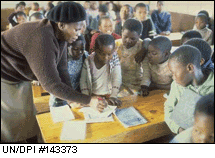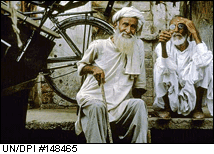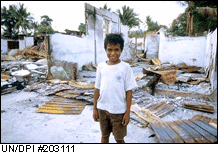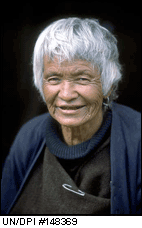|
|
Democracy International: Mobilizing for Global Development
The world is a jewel of many facets. Changes have taken place so quickly in recent years that instead of grasping the simplicity of the global whole, we are mystified by the complexities of interdependence. |
|
 |
| |
For every special interest, for every global problem with which we identify, there is a competing worldview. Single-issue advocates often do not see the big picture, not for lack of insight or because it is so terribly complex, but because the view of global interdependence has been filtered – colored through a new ideology. That ideology is opposed to the free flow of information about world conditions. That ideology tells us not to worry about the totality – it's being taken care of for us.
Willy Brandt encouraged people to see both the prospects and the pitfalls involved in global integration:
"The Commission considers it essential that the educational aspects of improved North-South relations be given much more attention in the future. It is imperative that ordinary citizens understand the implications for themselves of global interdependence and identify with international organizations that are meant to manage it" (N-S, 259)…. "If societies do not educate their citizens for the interdependent world they have inherited, their governments will find it difficult to take the decisions that an interdependent world economy demands" (CC, 144).
Citizens of the world are well aware of the private sector's designs for global integration, but the global public has not developed its own distinct viewpoint or raised its own comprehensive proposal for a future economy, beyond a vocal opposition by some to the policies of globalization. To attain the equilibrium it is seeking, the world public needs its own clear-sighted strategy, its own program for democracy international. |
| |

|
|
A humane plan for global integration begins in personal relationship. Though the world's people are divided by geography and language, we know a common destiny links us. We know that humanity is far more important than any nation, bank, or corporation. We have a certain awareness of the world as a whole, as a community of nations, though we have yet to express this understanding through our political and economic affairs. Integrity and trust rule our personal lives far more than our monetary and financial relationships. We are still learning what it takes to be neighbors on a small planet. |
| |
"The world is a unity," Brandt declared, "and we must begin to act as members of it who depend on each other. It is not enough, as one of our Commissioners put it, to sit around tables talking like characters in Chekhov plays about insoluble problems. We have to lift ourselves above the immediate constrictions, and offer the world a plan and a vision, without which nothing substantial can be achieved" (N-S, 47).
Have we come to the verge of global integration with no multilateral framework other than globalization? "There must be room for the idea of a global community," Brandt insisted, "or at least a global responsibility evolving from the experience of regional communities" (N-S, 13).
A unique global society, with its own ethic of interdependence, is now in its infancy. Pivotal stirrings of conscience can be heard in the conversations and aspirations of people everywhere as this new partnership arises. That community is committed to peace and progress. It is committed to conserving earth's resources and the environment. It is committed to life, liberty, and justice, to spreading democracy and creating open economies. It is committed to the equity and value of all people, to their self-reliance and capacity for self-development.
The environmental challenge has made the earth's geographic borders seem meaningless. Media broadcasts and digital information instantly spanning the globe have also made political boundaries seem far less significant.
|
| |
| The widespread mobility of refugees – due to famine, war, and the search for new employment – blurs political geographies even more. Multinational banks and corporations, likewise, have no particular loyalty to national borders, other than practical operational interests. Why, then, should citizens be expected to focus their interest and loyalty no further than a nation's frontiers? |
|
 |
|
The right to self-determination is no excuse for a nation to use its sovereignty as a weapon against other nations, or against its own people. Everyone is familiar with national ideologues who prey upon citizens' emotions to whip up support for a competitive cause. Sentiments of patriotic fervor, cries for protectionist barriers, fears for national security – useful in days of nation building – are becoming hindrances as the age of global integration ensues. How long can people be expected to give exclusive allegiance to a homeland when its policy decisions are made for it by big banks and corporations – sometimes other governments or international agencies – that are acting without regard to community interests and local concerns?
In spite of claims to the contrary, globalization opposes democracy. The ideology of globalization – which filled the vacuum of an unregulated international economy after the collapse of the communist bloc in 1989-91 – is simply unfettered capitalism, the equalization of compulsory market standards masking itself as international liberty. Without values for human development, globalization holds no democratic constituency, no checks and balances, no equal opportunity, and no parity. It is based, rather, on oligopolistic competition among multilateral banks and corporations, and the competitive geopolitical objectives of the world's twenty or thirty wealthiest nations. Where there are competing claims for economic ascendancy and power, there is no global vision, no consensus, and no collective action for the best interests of humanity.
Globalization requires instead that populations give up their sovereignty to make way for expanded markets. Under globalization, all that remains sovereign is the wealth of banks and corporations – a situation roundly endorsed by international bodies such as the World Trade Organization – while decisions are made over the heads of citizens, communities, and nations. |
| |

|
|
As a result, the average person has no personal relationship with the chieftains of globalization. In truth, we have far more in common with marginalized people in distant nations whom we've never met, than with multinational officers of institutions which pay us no heed. Little wonder that growing numbers of citizens perceive globalization as an insidious form of economic autocracy. |
|
Some heads of state, congressmen, and parliamentarians see the world's problems clearly and may stand ready to act for the common good, but no matter how wise or powerful, leaders cannot make global democratic changes on their own. The leap from domestic responsibility to co-management of the world economy is considerable. It requires leaders willing to risk bold, honest action at the expense of short-term political effects. The determination to tackle the world's complex issues cannot be generated by even the most enlightened of leaders without strong and informed public support. What limits the response of governments is not a shortage of resources or technical feasibility, but, as the Brandt Reports cautioned, "the lack of a clear and broadly and reflected awareness of the current realities and dangers, and an absence of the political will necessary to meet the real problems" (CC, 8).
If world leaders and international institutions are to be the highest expression of people's values, and authentically inspired by the populace they represent, civil society must itself embody those ideals. As the Brandt Commission suggested, the sweeping political decisions that are necessary:
"will not be possible without a global consensus on the moral plane that the basis of any world or national order must be people and respect for their essential rights, as defined in the Universal Declaration of Human Rights. Only if these ideas are sincerely accepted by governments, and especially by individuals, will the political decisions be possible and viable. This requires an intensive process of education to bring home to public opinion in every country the vital need to defend the values without which there will be no true economic development and, above all, no justice, freedom or peace" (N-S, 268).
|
| The catalyst in this movement for new accountability can only be the world's public. It is time for global civil society to challenge the power of unsupervised globalization. To swing the pendulum of political action away from global privatization to global economic democracy, a new vision is needed, a framework of action and policies that puts the needs of the poor and disenfranchised right at the core. |
|
 |
| |
A global citizens movement, with a powerful agenda for international development, is the necessary countervailing force in the transformation of globalization into global sovereignty. It is the world's only insurance policy. In coming months and years, representatives from non-governmental organizations, civil society, civic organizations, and individuals from rich and poor nations, must draw together closely, forming a powerful coalition to raise international development issues to the top of the world's agenda. Working alongside world leaders, civil representatives must keep up the pressure for emergency relief for the world's poor nations, improvements in income distribution and employment, changes in production and demand, protection against environmental deterioration, and new regulation of the global economy.
Global economic issues must be taken out of the realm of official abstraction and brought down to earth, demonstrating that the distribution of goods and services is merely a relationship, and like any other personal transaction, is best governed by sincere and honest values. This plain understanding, reinforced by opinion leaders, must spread to the masses, extending into every community and touching each person. Caring, mutual respect, generosity, and sharing begin at home, after all, and should be expressed no differently in global economic relations. It is, in fact, that simple. |
| |
 |
|
People of the world have a great responsibility as the twenty-first century moves forward. Increasingly aware that the global economic system is lacking in core human values, we are unsure how to respond, since our livelihoods depend on the international marketplace. Unlike those who speak for a democratic economy only to gain money, win votes, or blindly endorse the status quo, our actions must match our words. Time and energy are best spent, therefore, not in fighting globalization, but in transcending it, by demonstrating freedom, equality, and peace in every conversation, in every relationship, and every exchange. |
| |
Through assembly, discussion, and action, it is our role as world citizens to:
-
Remind international organizations that their power is vested in us, and they must not force governments to give up their sovereignty
-
Remind governments, who claim to represent us, that they were not elected to office by the banks and corporations
-
Remind the banks and corporations, who also claim to represent us, that the public did not elect them to their offices
-
Remind producers of their unsustainable production methods, and consumers of their unsustainable life-styles
-
Remind society of its unsustainable wage levels
-
Remind everyone that the fulfillment of individual need through local economic development is a human right and a cornerstone of the international economy
While governments, corporations, and the media continue to slant public opinion against the common interest, pitting one nation or region against another, people in developed and developing nations must gather and join resources, recognizing how closely their interests for human advancement coincide.
"No matter how enlightened the plans for the economic and social betterment of people's conditions," said Brandt, "they will achieve little unless in parallel the battle is fought at the same time in both North and South, to liberate people from outworn ideas, from the grip of narrowly conceived national interests and from the passions and prejudices inherited from the past. A new international economic order will need men and women with a new mentality and wider outlook to make it work, and a process of development in which their full capacities flourish" (N-S, 63).
To move ahead, our global xenophobia must be faced. Fear of 'world bureaucracy' is simply fear of the unknown.
|
| |
| No one wants a monolithic supranational body, or the dangers it would pose. World government is not necessary or desirable, but a new equation must be sanctioned. Strong multilateral rules and functions are needed to bridge the special claims of wealth, government, security, population, the environment, and human need. Global issues must be considered in the round, on an inclusive and representative basis. Power sharing is indispensable. |
|
 |
| |
Ancestral roots, racial identity, national culture, independence, and self-determination must also be carefully guarded and preserved. No people or region should be forced to lose its individuality. At the same time, guaranteeing a nation's sovereignty does not set its interests in opposition to democratic international organizations or international law. Allegiance to the world community will give new legitimacy to national sovereignty. A new dimension of international responsibility is not a frightening prospect so long as it is guided by basic human values, and the community of nations is equally represented. Ultimately, national security can only be ensured by global security.
Can it be so difficult to create a new economic system that honors the sovereignty and self-determination of nations? Is there really a good reason why nations can't be organized and governed according to both popular consent and global prerogatives? Can we not be just as patriotic about an international community that supports our national sovereignty and freedom? Are we not citizens of the world already, at home and in our communities?
As Brandt observed in 1983:
"A new century nears, and with it the prospects of a new civilization. Could we not begin to lay the basis for that new community with reasonable relations among all people and nations, and to build a world in which sharing, justice, freedom, and peace might prevail?" (CC, 10)
Part IV proposes an action program for a new global economy. |
| |
|
|
|
|
|
|
|

